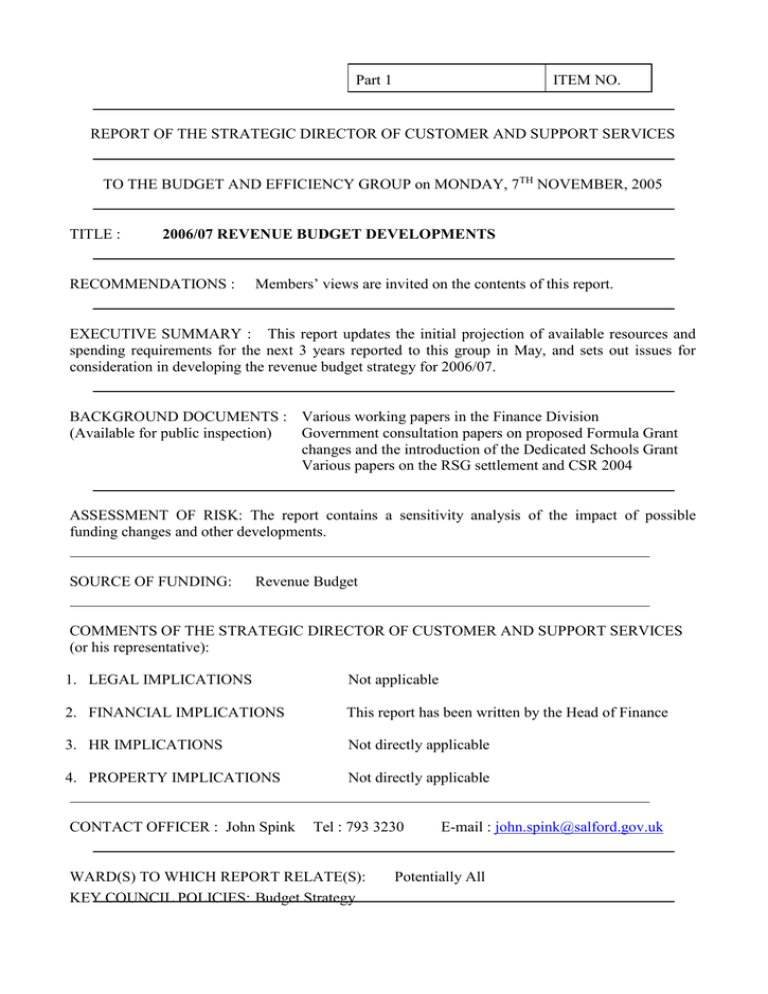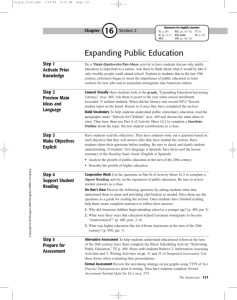Part 1 ITEM NO.
advertisement

Part 1 ITEM NO. REPORT OF THE STRATEGIC DIRECTOR OF CUSTOMER AND SUPPORT SERVICES TO THE BUDGET AND EFFICIENCY GROUP on MONDAY, 7TH NOVEMBER, 2005 TITLE : 2006/07 REVENUE BUDGET DEVELOPMENTS RECOMMENDATIONS : Members’ views are invited on the contents of this report. EXECUTIVE SUMMARY : This report updates the initial projection of available resources and spending requirements for the next 3 years reported to this group in May, and sets out issues for consideration in developing the revenue budget strategy for 2006/07. BACKGROUND DOCUMENTS : Various working papers in the Finance Division (Available for public inspection) Government consultation papers on proposed Formula Grant changes and the introduction of the Dedicated Schools Grant Various papers on the RSG settlement and CSR 2004 ASSESSMENT OF RISK: The report contains a sensitivity analysis of the impact of possible funding changes and other developments. SOURCE OF FUNDING: Revenue Budget COMMENTS OF THE STRATEGIC DIRECTOR OF CUSTOMER AND SUPPORT SERVICES (or his representative): 1. LEGAL IMPLICATIONS Not applicable 2. FINANCIAL IMPLICATIONS This report has been written by the Head of Finance 3. HR IMPLICATIONS Not directly applicable 4. PROPERTY IMPLICATIONS Not directly applicable CONTACT OFFICER : John Spink Tel : 793 3230 WARD(S) TO WHICH REPORT RELATE(S): KEY COUNCIL POLICIES: Budget Strategy E-mail : john.spink@salford.gov.uk Potentially All KEY COUNCIL POLICIES : Budget Strategy _______________________________________________________________________________ DETAILS 1. INTRODUCTION 1.1.Members have previously considered reports concerning the revenue budget : on 23rd May regarding an initial 3-year projection of available resources and spending requirements at their meeting, on 25th July regarding Formula Grant changes proposed by the Government. 1.2.This report seeks to update members on developments since those reports in preparation for the detailed work on the revenue budget which will commence in the next few weeks as the provisional Revenue Support Grant is announced. 2. RECAP 2.1.Next year will see some important changes in local government finance, notably : schools to be funded directly from specific grant phased introduction of 3-year revenue and capital settlements planned review of RSG data to take account of outstanding 2001 Census updates 2.2.In 2007/08, the Government had planned to implement revised Council Tax bandings following revaluation, although this has now been deferred until 2010 to allow the Lyons review to extend its remit to include the review of local government services. Implementation of any changes to the balance of funding arising from the original remit of the Lyons review has likewise been deferred to 2010. 2.3.Salford’s budget for 2005/06 is £294.772m and is funded by :Revenue Support Grant Business Rates Formula Grant Council Tax Total £m 149.297 72.157 221.454 73.318 294.772 2.4.The key points of the report on 23rd May were that : For 2006/07, the base budget and RSG need to be reduced by the expected amount of Dedicated Schools Grant, which was previously estimated at £110.640m. The revised starting point for assessing the spending requirement is therefore £184.132m and RSG £38.657m. Total spending requirement was assumed to increase by 8.5% to £199.847m Formula Grant (RSG + NNDR) would increase by a minimum (floor) of 4% to £115.247m Council Tax revenue would increase by 3% to £75.518m There would be a resulting funding gap of £9.082m. 2.5. 2.6. Following further information from the DfES of what will rank against the Dedicated Schools Grant, the 2005/06 base amount of grant for working out the grant increase for 2006/07 is £118.062m. This therefore amends the total spending requirement to £192.425m and the RSG to £31.235m. The funding gap becomes £9.380m. The key assumptions contained in the assessment of the spending requirement were : pay inflation at 3% price inflation at varying amounts to reflect current budgetary practice, current economic conditions and spending plans, ie General supplies items Other specific charges determined externally Insurance/pensions DSOs Gas (contract renewal 1/6/06) Water (OFWAT agreed 10% + inflation for UU) GMPTA (as per spending plans) GMWDA (as per spending plans) 0% 2.5% 5% 3% 60% wef 1/6/06 12.5% 4% 8.5% The level of significant above-inflation increases for utility and waste disposal costs should be noted. allowance for specific issues, mostly inherent from the 2005/06 budget, ie Pensions contribution rate Job evaluation Capitalisation of revenue Rent rebate adjustment Time-expired grant funded schemes Growth in services Passporting Social Services FSS increase + 1% budget provision of £2.3m eliminated eliminated £1m provided for £1m provided for 2.7.A full analysis of the 3-year projected spending requirement produced in May, as adjusted for the change to the Dedicated Schools Grant, is contained in Appendix 1. 3. DEVELOPMENTS 3.1.Formula Grant proposals The report to this group on 25th July identified the possible impact upon Salford’s RSG entitlement. Within a range of a best case scenario of + £18.3m to a worst case scenario of - £3.7m, a more likely scenario would be a gain of £3m. However, this gain would be taken up by a similar increase in the GMPTE levy, resulting in an overall cost neutral impact. This position could be improved by £2m or £3.3m according to which of 2 Formula Grant change options concerning Younger Adults in the Personal Social Services FSS are implemented, although the view is that both options were volatile in their distributional impact and therefore ran the risk of being withdrawn. The closing date for consultation responses was 10th October and Salford’s response was submitted by the due date. The final outcome is unlikely to be known until the ODPM announce the provisional RSG settlement in late November. An update of the population data has also been announced and this indicates Salford’s population at mid-2004 at 216,400 has reduced marginally by 200 (0.1%) from the mid-2003 figure. Against a national trend of a 0.5% increase, this will create a damping effect on Salford’s FSS and RSG entitlement. 3.2. Current GMAMT assumptions Current assumptions being made across GM about Council Tax and RSG increases obtained from Treasurers is shown in the table overleaf. Authority Council Tax Bolton Bury Manchester Oldham 4.5 – 5% <5% 2.5% 4.99% Rochdale c. 4.5% Salford Stockport Tameside Trafford Wigan 3% 4.5% 3% 5% <5% Comments RSG Comments Political decision <5% 4 – 6% 3.7% Range of options No account of proposed changes Remodelling budgets on best and worst case scenario Anticipated Floor 4% Floor increase Floor increase 4.5% last year, probably around the same Exc of precepts Exc of precepts 2.4% 3.5% 3% 3% 2.5% On Council Tax, Salford are at the lower end of planned increases, with only Manchester planning a lesser increase at 2.5%. All are expecting a capping limit at 5%. On RSG, Salford appears to be more optimistic than most about the level of the grant floor at 4%. 3.3. Dedicated Schools Grant The DfES have produced details of what they expect the 2005/06 schools budget baseline to be for the purposes of working out the 2006/07 Dedicated Schools Grant (DSG). This baseline has been framed around Section 52 returns for the 2005/06 budget and gives a signal that the DfES are intending to use expenditure figures rather than FSS as the basis for determining the DSG and the FSS adjustment. (Note : Salford spends £4m above FSS on schools) Whilst the exact detail of the intentions of the DfES are still far from clear, the following issues are matters which have been identified which will need close scrutiny and clarification when the provisional RSG settlement is announced : Will the DfES base the FSS adjustment on the 2005/06 Schools FSS or Section 52 returns ? How will any transitional scheme phase in gains and losses for authorities spending above and below Schools FSS ? Salford currently provides £1.8m of NRF funding to Education expenditure, although this is held corporately, outside the LEA or schools budgets. We will need to identify what opportunities the schools funding changes present to utilise this grant for alternative mainstream funded projects, for a funding source for time-expired grant funded schemes or for new projects which meet the floor targets for NRF. 3.4.LGA/SIGOMA issues Increasingly pessimistic comments have been made recently about how tight the RSG settlement may turn out to be. Illustrative of these comments is the attached table at Appendix 2 which has been produced by the LGA. This indicates that, when allowance for certain specific grant changes is made, notably the Dedicated Schools Grant, the year-on-year increase in AEF would only be 1.5%, and could even be interpreted as being no more than 0.3%. Whilst it is understandable that the LGA and others may use these figures to lobby the Government for an increase in funding, these comments are predicated upon Council Tax producing a 7.5% increase. At a time when the Government is signalling a capping limit of 5% this position does not seem credible and it is considered that a switch from Council Tax into RSG should be expected consistent with the Government’s position on capping. However, some neighbouring authorities are known to be budgeting around this worse case scenario. The LGA have also been lobbying for additional funding to be put into RSG to reflect pressures upon services and have identified a £2bn “black hole” in terms of additional funding required by local government (NB : adjusted AEF is currently around £20bn) 3.5.Budget monitoring issues Key spending pressures which are emerging from budget monitoring during this year are : Children in Care A budget overspend of £1.5m for 2005/06 can be funded by the directorate from a combination of one-off (£464k) and continuing measures (£1.036m). For 2006/07, a strategy will need to be considered with regard to how the one-off funding in 2005/06 can be replaced. Community, Health and Social Care – Learning Difficulties A budget overspending of £790k for 2005/06 can be funded by the directorate from a combination of one-off (£308k) and continuing measures (£482k). For 2006/07, a strategy will need to be considered with regard to how the one-off funding in 2005/06 can be replaced and a projected long term increase in the client base arising from longer life expectancy is to be funded. Community, Health and Social Care are currently quantifying the increase in the client base. Supporting People Grant Uncertainty currently exists over the level of funding in 2006/07 following a 5% reduction in funding for 2005/06. Whilst the Government appears to have postponed their planned change to the distribution formula for 2006/07, there remains fears that funding will be further reduced, possibly by a similar amount. Whilst Housing is currently on target to achieve the full year 5% reduction required in the 2005/06 grant in readiness for 2006/07, there are concerns that the effect a further grant reduction in 2006/07 will have upon the service. 3.6.Council Tax Base A mid-year review of the Council Tax base indicates a growth of some 700 dwellings liable for Council Tax, which would give a tax revenue growth of around £800k (1.1%). 3.7.Business Growth Incentive Scheme A crude assessment of what may be available from this scheme is approximately £1m for each of the years 2005, 2006 and 2007. The Government have said local authorities are free to determine how best to use this money, but have a preference for it to be used to support economic development. No provision for use of this money has been made in the budget assumptions. 3.8.Review of VFM Self-assessments Reviews have now been mostly completed and a separate report is contained elsewhere on the agenda. The group needs to identify what, if any, reviews should be expected to contribute efficiencies towards the budget process for 2006/07. 3.9.Gershon Efficiency Proposals The Service Improvement Board was due to consider the efficiency proposals for 2006/07 at their meeting on 18th October but the meeting was unfortunately postponed. On the basis of proposals received to date, efficiencies which can contribute to the budget amount to £411k. The group needs to identify what, if any, further efficiencies should be expected to contribute towards the budget process for 2006/07 at this stage. For information, the 1.25% cashable efficiency target for Gershon purposes is around £3.5m, although net of elements for capital and levies from waste and passenger transport is around £1.8m. 3.10. Development of medium-term financial strategy A separate report is contained elsewhere on the agenda that identifies the principles of a financial strategy for the next 3 years. The group is requested to approve this strategy for submission to Cabinet. 4. BUDGET FORECAST UPDATE 4.1. In the light of matters raised above, it is considered that the following adjustments can be made to the budget forecast :- Previous Projection (as adjusted for DSG) Formula Grant changes/concessionary fares Gershon efficiency proposals Council Tax base buoyancy Revised Projection Resources £m 183.045 + 3.000 + 0.800 186.845 Expenditure £m 192.425 + 3.000 - 0.411 195.014 Funding Gap £m 9.380 - 0.411 - 0.800 8.169 4.2.The key risks to the above assumption are : The Formula Grant changes are not as favourable as expected and are limited to less than the 4% floor – impact : funding gap increases by £1.1m for each 1% below a 4% floor Schools funding – there is no transitional gain - impact : funding gap increases by £1.4m Service pressures identified above cannot be absorbed by the services concerned - impact : funding gap increases by up to £1.5m Settlement of arrears for Job Evaluation – impact : unknown at this stage 4.3.The key opportunities which would help to reduce the funding gap if they occur are : Favourable RSG changes – notably to the Younger Adults FSS - impact : funding gap reduces by between £2m and £3.3m Time-expired Grant Funded Schemes – the additional budget provision is not required impact : funding gap reduces by up to £1m 4.4.Clearly, there remains scope for huge volatility in the budget forecast for both resources and expenditure, whereby the funding gap could increase by say a further £4m or more at worst, or could narrow by £4.3m at best. 4.5.Other issues of note are : The impact of job evaluation - £2.3m is provided for a cost increase in 2006/07. Work is proceeding with HR to quantify the likely potential cost based on work to date, including arrears of back pay. The impact of time-expired grant funded schemes - £1m is provided for funding to allow the continuation of projects. The reallocation of resources - £1m is provided for growth in services, of which £192k is committed towards the Littleton Rd Sports Village (£50k) and the Higher Broughton Community Hub (£142k). Efficiencies – whether further efficiencies should be sought at this stage Business Growth Incentive Scheme – what funding opportunities this presents. 5. CONCLUSIONS 5.1.There remains too much uncertainty around the Formula Grant changes as to be able to project with any certainty the likely position the Council will face when the provisional RSG settlement is announced in late November. 5.2.The position could vary between the budget needing reductions of around £4m to achieve a balanced budget to one where up to £12m of budget reductions could be needed. 5.3.The announcement of the provisional RSG settlement is now only around 3 to 4 weeks away and there seems little point in setting severe targets for savings if they are not required, although services will need to be ready to respond to any call for savings if the RSG settlement is worse than feared. The separate report elsewhere on the agenda concerning the review of VFM selfassessments may present opportunities where some savings could be expected to contribute to the budget, but strategic directors have been requested to be prepared to report back quickly with further savings proposals should the need arise. 5.4.If a savings target from efficiencies is to be set then it should be noted that each 1% would produce savings of £1.45m. A view as to whether this should be targeted or applied across the board is required. 5.5.Key aspects of the RSG settlement in which Salford will have a keen interest and may wish to lobby on (should the opportunity permit) or brief MPs about are : impact of the schools funding change concessionary fares – distribution basis the Younger People FSS changes updating resource equalisation in the RSG settlement sufficiency of funding in total – especially for children in care, adults with learning difficulties, waste disposal, pensions costs and concessionary fares sufficiency of the grant floor amount ALAN WESTWOOD Strategic Director of Customer and Support Services



